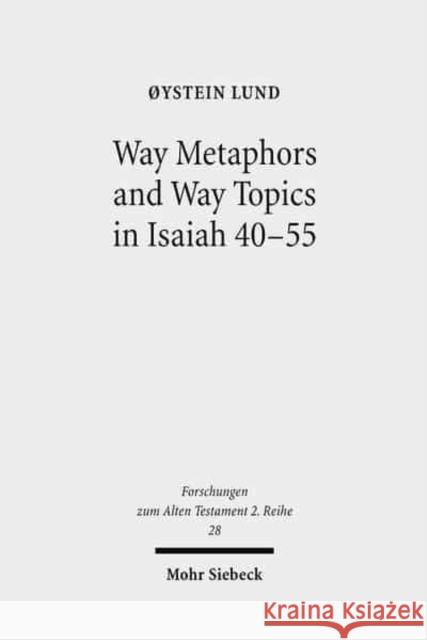Way Metaphors and Way Topics in Isaiah 40-55 » książka
Way Metaphors and Way Topics in Isaiah 40-55
ISBN-13: 9783161490873 / Angielski / Miękka / 2008 / 331 str.
Oystein Lund gives a new approach to texts in Isaiah 40-55 that deal with ways and desert transformation. Earlier exegesis has mainly read these texts in a literal way. In recent years, exegetes have pointed out that the so-called 'exodus texts' should rather be interpreted metaphorically. The author supports this, and accordingly seeks to continue this discourse by systematizing, intensifying, and deepening the argumentation for a metaphorical reading. He argues that most of the way-texts in Isaiah 40-55 are interrelated, and gradually contribute to explore questions regarding the way-situation of the people. Several subsequent way-texts are related to this text, and together these draw a coherent picture in which the problematic way-situation of the people in the past and present is transformed. The author argues that such a coherent reading of the way-texts gives good meaning, which is consistent with the over all message of Isaiah 40-55.
ystein Lund gives a new approach to texts in Isaiah 40-55 that deal with ways and desert transformation. Earlier exegesis has mainly read these texts in a literal way. In recent years, exegetes have pointed out that the so-called 'exodus texts' should rather be interpreted metaphorically. The author supports this, and accordingly seeks to continue this discourse by systematizing, intensifying, and deepening the argumentation for a metaphorical reading. He argues that most of the way-texts in Isaiah 40-55 are interrelated, and gradually contribute to explore questions regarding the way-situation of the people. Several subsequent way-texts are related to this text, and together these draw a coherent picture in which the problematic way-situation of the people in the past and present is transformed. The author argues that such a coherent reading of the way-texts gives good meaning, which is consistent with the over all message of Isaiah 40-55.











